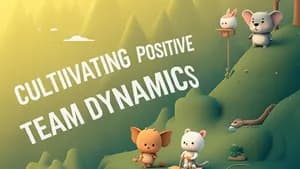Introduction: The Power of Collaborative Learning
In today's interconnected world, the ability to collaborate effectively is paramount. Whether you're working on a group project in school, participating in a sports team, or tackling a challenge with friends, mastering the art of teamwork can significantly enhance your learning experience and overall success. This article focuses on effective team meetings – a cornerstone of successful collaboration. We'll explore practical strategies to make your meetings productive, engaging, and enjoyable, transforming them from dreaded obligations into powerful tools for achieving shared goals. Think of a team meeting not as a chore, but as a structured opportunity to learn from each other, build relationships, and strengthen your collective understanding. I've seen firsthand, time and again, how well-structured meetings can turn struggling groups into high-achieving units.
Planning and Preparation: Laying the Groundwork for Success
Before you even gather for a meeting, meticulous planning is key. Imagine a sports team walking onto the field without a game plan – chaos would ensue. The same applies to your study groups. Start by defining a clear objective. What specific outcome do you want to achieve during the meeting? Is it to brainstorm ideas for a presentation, review material for an exam, or divide tasks for a research paper? Once you know your goal, create a detailed agenda. This agenda should include specific topics, allocated time slots for each, and designated roles for participants. For example, if you're reviewing for a history test, allocate time for specific chapters, assign someone to lead the discussion on each, and dedicate time for summarizing key concepts. Sending this agenda in advance allows everyone to prepare, ensuring efficient use of your shared time. This is crucial for effective collaboration, and shows respect for everyone's time commitment.
During the Meeting: Fostering Inclusive Participation
Now that you're ready, let's focus on making the meeting itself productive. Remember, the success of your meeting hinges on inclusive participation from everyone. To achieve this, create a welcoming and respectful environment. Encourage everyone to share their ideas, even if they seem unconventional. One effective technique is to begin with a brief “check-in” where each member shares their current understanding or challenges related to the topic at hand. This helps gauge everyone’s level of comprehension and identifies areas requiring more attention. Implement active listening techniques. Pay attention to what your teammates say, ask clarifying questions, and show genuine interest in their contributions. Avoid interrupting or dominating the conversation. Assign roles like ‘facilitator’, ‘scribe’ and ‘timekeeper’, rotating these roles among the group members across meetings. This ensures that leadership and responsibility are distributed equitably. It is remarkable how much better collaboration becomes when everyone feels seen, heard, and valued.
Managing Conflict and Differences of Opinion
Even in the most harmonious teams, disagreements can arise. Instead of viewing conflict as a threat, embrace it as an opportunity for growth and deeper understanding. Remember, different perspectives are valuable assets. When a conflict occurs, encourage open and respectful communication. Help team members articulate their viewpoints clearly, avoiding accusatory language. Focus on the issues, not on personalities. I've found that implementing a structured problem-solving approach, such as brainstorming alternative solutions and evaluating their pros and cons, can be incredibly effective in resolving disagreements constructively. Remember that reaching a consensus doesn't always mean everyone agrees on every detail. Sometimes, finding a solution that incorporates elements of various viewpoints is the most successful approach. Celebrate and value diverse contributions as it enriches the overall collaboration process and leads to better outcomes.
Post-Meeting Follow-Up and Action Planning
The meeting doesn't end when you disperse. A critical step towards sustained success is the follow-up. The ‘scribe’ should summarize key decisions and action items, distributing this summary to all members immediately after the meeting. This ensures that everyone is on the same page and avoids misunderstandings. It also establishes accountability. Assign specific tasks with clear deadlines. Regularly check in with your teammates to monitor progress, offering support and addressing any challenges that emerge. One technique is to create a shared online document where everyone can update their progress and share relevant resources. This transparency boosts accountability and facilitates smoother collaboration. Regularly review the effectiveness of your meetings. Ask yourselves: Did we achieve our objectives? Was the time used efficiently? What could we do differently next time? By continuously refining your processes, you can ensure that team meetings evolve into powerful tools supporting your collaborative endeavors.
Conclusion: Transforming Meetings into Tools for Success
Effective team meetings are not about just getting together; they are about strategically harnessing the power of collaboration to achieve shared learning goals. By implementing the strategies outlined above—meticulous planning, inclusive participation, constructive conflict management, and diligent follow-up—you can transform your meetings from tedious obligations into dynamic learning experiences. Embrace the opportunity to learn from each other, support each other, and celebrate each other's successes. By applying these principles, you’ll discover the immense power of collaborative learning and teamwork, which extend far beyond your current group projects and into your future endeavors. Remember, the skills you develop in teamwork and effective communication are valuable assets that will serve you well throughout your life.

